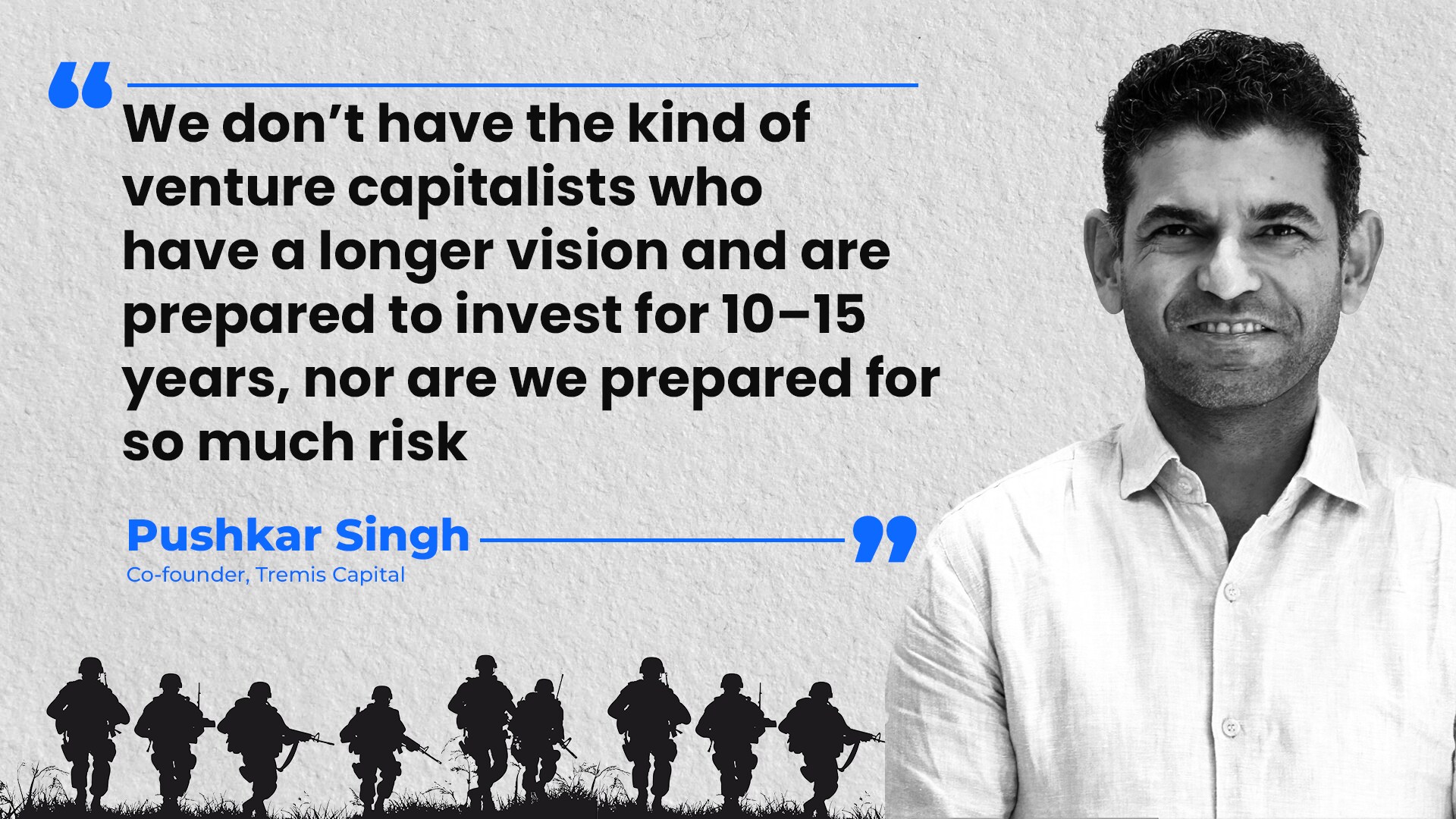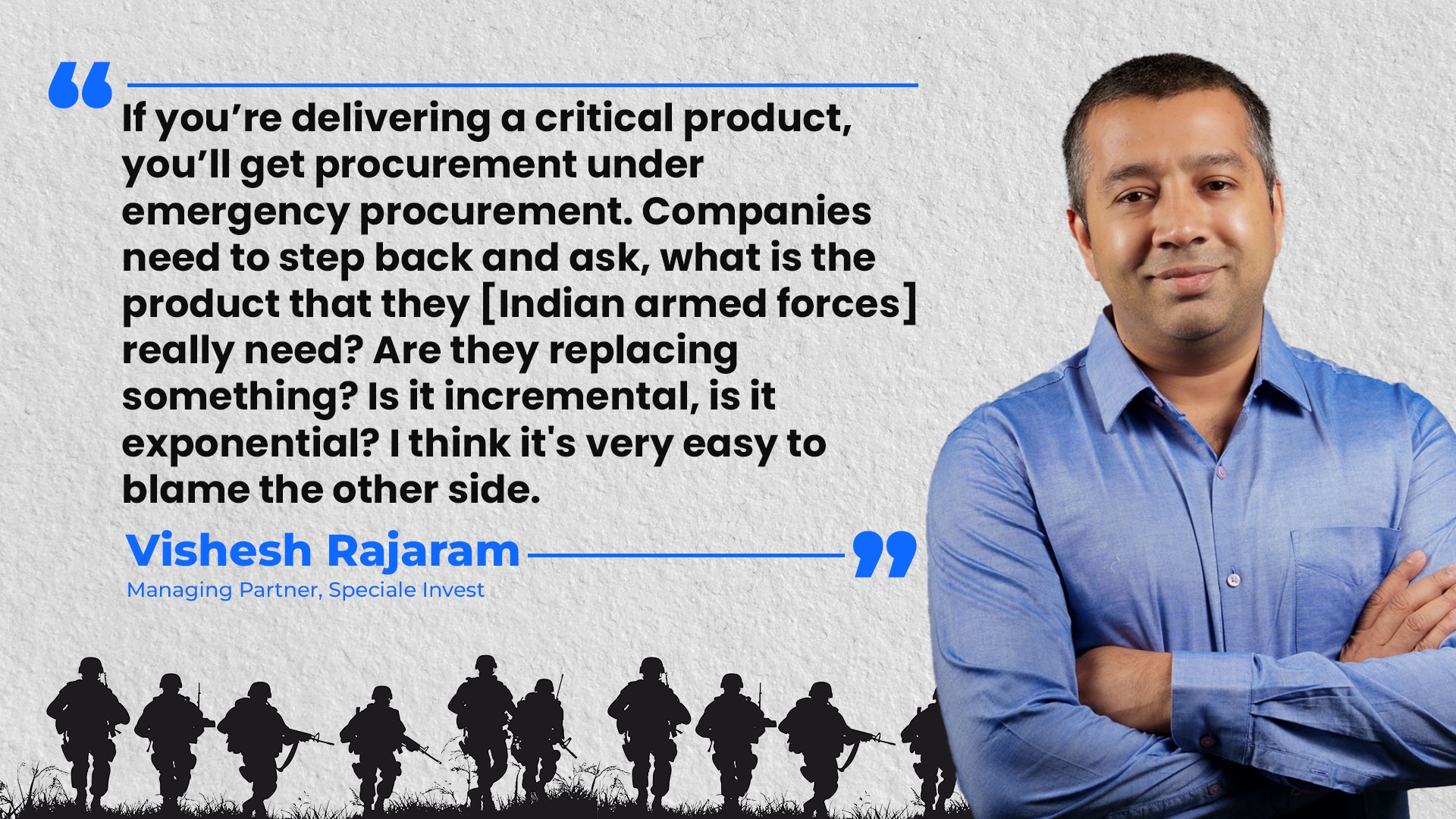
While the government's push for indigenisation has made it easier for startups to enter the defence sector, venture capital firms and individuals are still hesitant.
It's a multi-pronged problem.
Defence startups tend to have longer-than-average gestation periods, are extremely capital intensive, strictly regulated and have unreliable payment schedules from government contracts. It's the picture perfect image of a risky bet for most VCs in the ecosystem.
Dr Ajay Kumar noticed this during his tenure as Union Defence Secretary and moved to fix the problem. He was involved in setting up iDEX—Innovations For Defence Excellence—which formally launched in 2021.
During Defence Expo 2022, the first ever conference was setup up for VCs, the financial world and the defence startup ecosystem to find a way forward.
The results were not encouraging.
“Most of the participation came from banks and long-term lending institutions, that's not what startups needed really,” says Dr Kumar.
Following his retirement, Kumar started his own VC firm—Mount Tech Growth Fund—a category II alternate investment fund which focuses on startups working in the national security, defence & aerospace, and digital communications sectors.
Government Unreliability
“The government is an unreliable pay master,” says Tremis Capital Co-Founder Pushkar Singh. He points out that contracts with regular cashflow are difficult to get hold of and despite that, are often fickle in nature.
Singh narrates an experience with a drone company that Tremis Capital has invested.
The company's largest client was the Himachal Pradesh state government which was using it to deliver medication to far flung areas where it was difficult for cars to reach.
“The cash flows were so unreliable that the founders decided to reduce the size of the government contract part of their business,” says Singh. The company pivoted to servicing private companies like LensKart, Swiggy and Zomato to aid their last mile delivery.
While admittedly, it's not a defence contract, it does serve as an example of why government contracts lead to a lack of confidence among investors, especially if companies don't have other clients in their kitty.
India's VC Mindset
India's built a name for itself as a home for software product and software-as-a-service startups. While the push for indigenisation has led to a spurt in hardware companies popping up, that market, while growing, will take time to cultivate too.
It's fundamentally different, for example, from how the U.S. approaches defence and defence tech startups. Across the pond, startups in the defence sector get their foot in the door through government grants first. Once they're big enough is when larger VC funds step in.

(Graphic by Akshay Sandankar/ NDTV Profit)
In fact, nearly 60% of funding for Indian startups went towards consumer technology, fintechs, software, and SaaS companies in 2023, according to a joint report from Bain & Company and the Indian Venture and Alternate Capital Association.
The remaining 40% or so went towards traditional investment sectors like banking, financial services and insurance as well as emerging domains like electric vehicles and generative artificial intelligence.
“In defence, to solve technology problems you need long-term, patient risk capital,” says Mount Tech's Kumar. He explains that for that to happen, there needs to be an understanding of what the technology profile might look like in three to five years and an understanding that work being done right now, will be at the cutting-edge within the same timeline.
Who Came First: The Prototype Or The Funding?
VC firms would like to see proof of concept or an established contract before making an investment, but, startups that win iDEX challenges are hoping that it'll boost investor interest in their product offerings.
The current scenario makes for the proverbial chicken or the egg problem.
Government initiatives like iDEX signal requirements to the defence startup ecosystem at large that there are requirements. They're even going the additional step: Providing money to build a proof-of-concept. Startups need to take on some responsibility from there.
"The shift to expanded revenues is a two-way street," says Vishesh Rajaram, managing partner at Speciale Invest. The VC firm provides pre-seed and seed funding rounds to deep tech companies.
Of course, that's easier said than done, but Rajaram maintains that companies need to "farm their networks" and build a business case to pitch to the different departments and sub-departments within the defence ministry.
It's a flashpoint of sorts for companies. Recognise whether your product offering is absolutely mission critical or just nice to have. If it's the latter, maybe founders need time to think about how commercialising will keep the lights on.

(Graphic by Akshay Sandankar/ NDTV Profit)
Agnikul Cosmos stands out as one example of how a company has found a path to success through both defence and commercial applications of their launch vehicle, Agnibaan.
But that is also by virtue of their product offering. They could be launching Indian satellites, or foreign ones, commercial ones or those with defence applications. While a company like Agnikul took a long time to finally get going, it can be attributed to the fact that the technology they're building is complicated and time-consuming, justifying a long-term investment horizon.
But that isn't necessarily true across the defence startup ecosystem.
Startups engaged in building optical sensors or just sensors in general have shorter timelines. They're building products that can have non-defence applications. But for a company that's building anti-drone solutions? Commercial paths are limited and the ramp up in business takes longer.
"I think its very case-specific," says Rajaram.
Essential Business Intelligence, Continuous LIVE TV, Sharp Market Insights, Practical Personal Finance Advice and Latest Stories — On NDTV Profit.























